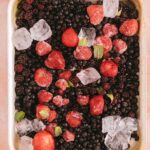Raising chickens can be a rewarding experience, providing fresh eggs and natural pest control. However, ensuring their health and safety requires understanding what foods are harmful to them. This guide covers common foods toxic to chickens, helping you keep your flock safe and thriving.
Bread: Empty Calories and Digestive Issues
While seemingly harmless, bread offers little nutritional value to chickens. It can lead to digestive problems and even deformities. Bread also tends to get stuck in the bird’s crop, causing discomfort. A diet high in carbohydrates from bread results in excessive waste production, which can be a nuisance.
Raw Meat: Risk of Salmonella
Feeding raw meat to chickens poses a significant health risk due to the potential presence of Salmonella and other harmful bacteria. These pathogens can cause illness in your flock and potentially spread to humans through contaminated eggs.
Raw Eggs: Encouraging Egg Eating
Although cooked eggs can be a healthy treat for chickens, raw eggs should be avoided. Consuming raw eggs can entice chickens to start eating their own eggs, a difficult habit to break once established.
Avocado Pits and Skins: Persin Toxicity
Avocado pits and skins, as well as the leaves of the avocado plant, contain persin, a toxin that can be fatal to chickens. Persin can cause respiratory distress, weakness, heart damage, and even sudden death. It’s best to avoid feeding any part of the avocado to your flock, including the flesh, as traces of persin may be present.
Fruit Pits and Seeds: Cyanide Concerns
Many fruits are safe and beneficial for chickens, but avoid giving them fruits with seeds (like apples and pears) or pits (like cherries, plums, peaches, and apricots) without removing them first. These seeds and pits contain small amounts of a cardiac-toxic cyanide compound, which can be fatal in larger quantities. The fruit flesh itself, once the seeds and pits are removed, is generally safe.
Rhubarb & Rhubarb Leaves: Laxative Effects and Oxalic Acid
Rhubarb stalks contain anthraquinones, which can have a strong laxative effect on chickens. Rhubarb leaves are even more dangerous. When damaged by severe cold, they can have a fatally high concentration of oxalic acid, which is toxic to chickens.
Onions & Garlic: Potential Irritants and Flavor Changes
Onions contain sulfur compounds that can irritate a chicken’s mouth, esophagus, or crop, potentially causing ulcers. Both onions and garlic can alter the flavor of your chicken’s eggs. While some chicken keepers use garlic for its potential health benefits, particularly respiratory support, it’s important to be aware of the potential flavor changes if you intend to consume the eggs.
Raw Potatoes and Peels: Solanine Toxicity
Raw potatoes and peels contain alkaloid solanine, a toxin that can harm chickens. Sweet potato peels are generally considered safe.
Green Potatoes and Tomatoes: Solanine and Chaconine
Green potatoes and green tomatoes contain solanine and chaconine, toxins that can cause drowsiness, paralysis, and even death in chickens. These toxins do not disappear with cooking, so it’s best to avoid feeding any green parts of potatoes or unripened tomatoes to your flock.
Undercooked or Dried Beans: Phytohaemagglutinin
Never feed raw or dried beans to chickens. Beans contain phytohaemagglutinin, a toxin that is fatal to birds when not properly cooked. Kidney beans are particularly dangerous. Keep bean plants well away from your chickens.
Salt and Salty Foods: Electrolyte Imbalance and Dehydration
Excessive salt intake can disrupt a chicken’s electrolyte and fluid balance, leading to excessively wet feces, thirst, dehydration, kidney failure, and even death. High salt content can also cause deformities in eggshells over time.
Processed and Greasy Foods: Unhealthy and Harmful
Processed and greasy foods offer little nutritional value and can be detrimental to a chicken’s health, leading to weight gain, heart problems, and other health issues. Avoid feeding your flock pizzas, sausages, or other highly processed foods.
Caffeine: Cardiac Issues
Drinks containing caffeine can be toxic to chickens, increasing heart rate, inducing arrhythmias and hyperactivity, and potentially leading to cardiac arrest.
Chocolate: Theobromine and Caffeine Poisoning
Chocolate should never be given to chickens. It contains theobromine and caffeine, which can cause vomiting, diarrhea, increased heart rate, hyperactivity, tremors, seizures, and even death. Chickens can succumb to chocolate poisoning within 24 hours of ingestion.
Moldy Produce: Mycotoxins and Liver Cancer
Mold that grows on soft fruits, nuts, corn, and apples produces toxins known to contribute to the development of liver cancer in both humans and animals, including chickens. Ensure your flock’s feed remains dry to prevent mold growth and never feed them moldy produce.
